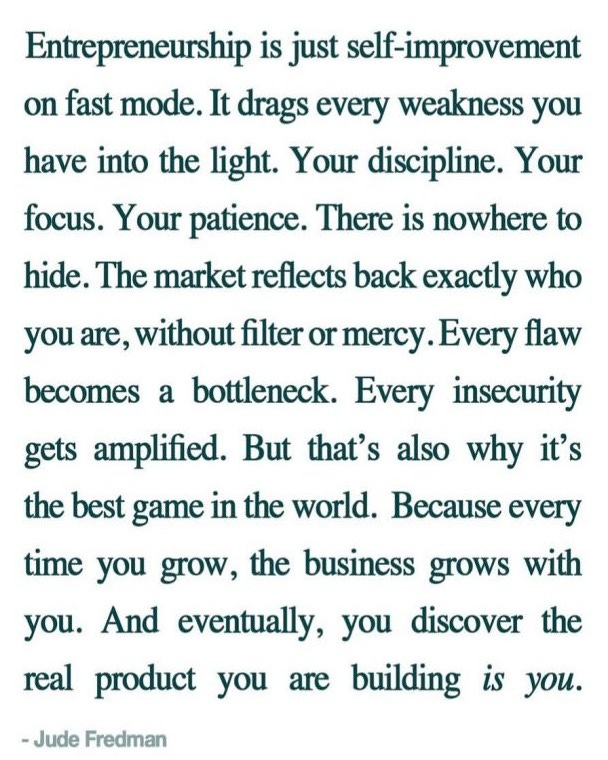What No One Tells You About Handling Feedback
Practical tips to keep in mind
Hi friend,
How are you? I hope you’re doing great.
As you may have noticed, I often talk here about different tactics for developing effective visual stories.
Since I bet you’re not working on a remote deserted island, but always surrounded by teams, clients, friends and family, today I’d like to focus on how to handle feedback to your stories.
When you think about it, one of the most exposed groups in business are startup founders.
They’re constantly receiving feedback on their pitches, whether about their product, revenue model, value props, their excitement level, or simply for not having a strong story at all.
Want to see this in action? Check out Founder Tactics, a podcast with Julia Lucidi, where founders share stories of turning obstacles into opportunities and building success through community.
The other day, Julia shared this quote on LinkedIn that really spoke to me:
As an entrepreneur in various past ventures, and currently serving as CMO at DecisionAdvantage.ai—an AI-powered decision engine for high-stakes dilemmas - I can totally relate.
As part of my work, I tell stories to woo investors, clients and motivate employees. The common thread that runs through it all is adaptability.
You need a unique mix of assertiveness, humility, and openness to change mid-stream - which I believe - are key assets to have in any job.
This is where growth lives.
I can’t tell you how many times I received push backs, expert advice on how things really work.
Some feedback provided valuable perspective and highlighted gaps I appreciated; other points I considered less applicable.
If you’re managing your own business or working in a corporate environment - the ability to collaborate, accept criticism, and use judgement to effectively navigate your ideas despite office politics, egos, or mere work overload - is all part of your personal development journey.
I touched on this topic when I talked about working under uncertainty:
Another example
For the past five years I’ve been serving as a startup mentor at the Venture Mentoring Team, a global non-profit organization that provides free advice to founders.
I select a startup of interest, and join a group of mentors to help the founder. We look for founders who are coachable and follow a clear action plan from meeting to meeting.
I’ve learned a ton from both my fellow mentors and the founders we coached.
Having said that, I can also see the founder’s perspective being on the receiving end of our barrage of suggestions, and the need to evaluate what realistically she should start, stop, continue or change.
Because as much as we invest time helping, at the end of the day the full accountability lies with the founder.
Why still care?
Don’t get me wrong, getting feedback is paramount.
Steve Blank calls it “getting out of the building.”
For an early stage startup, doing a Product Market Fit is crucial. Doing it right means for example, running customer interviews or surveys.
However it’s you - as founder - who eventually needs to decide how to translate the overarching narrative stemming from all these suggestions into an actionable strategy.
This strategy needs to support both what your customer truly wants and what you as a brand wants -built around a profitable model.
Early on the stakes are the highest.
Over 90% of startups fail because the founders never left their comfy false narrative eco chamber, and later discovered there is practically no market need for their nice-to-have widget.
Lastly, seeking feedback regularly is essential for any business at any stage to stay relevant.
We’re living in a fluid environment with changing customer wants, new competition, evolving market conditions, tech innovations, or external factors like pandemic or natural disasters.
Yep! To effectively navigate your ship, your GPS needs to be always calibrated to actual weather conditions.
One more for the road
To bring this story home, here is another mantra I try to live by, even though it’s hard but so worth it:
“When you walk into the room, hang your ego at the door.
It’s not about being right, it’s about getting it right.”
— Anonymous
In short…
Always be ready to rewrite the story you tell yourself - ignoring your nagging ego’s protests- if it gets you closer to your end goal.
See you next time!
Best,
- Shlomi
Shlomi Ron
Founder, Visual Storytelling Institute
story > visual > emotion > experience
shlomi@visualstorytell.com
Loved this post? Take your visual storytelling skills to the next level as a Narrative Partner. You’ll get:
The “Top 10 Business Storytelling Formulas” eBook—practical frameworks to craft marketing that captivates and converts.
Exclusive content + bi-weekly Sunday insights to sharpen your narrative thinking, decode trends, and apply visual storytelling with confidence.
Full archive access for endless inspiration, fresh ideas, and proven techniques—ready whenever creativity strikes.
A quarterly “30-minute” personalized coaching session to up your visual storytelling game.
Start your 7-day free trial and grow into the storyteller your brand needs.






